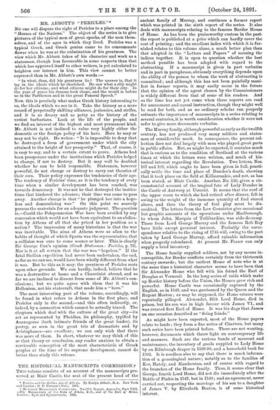MR. ABBOTT'S "PERICLES."* No one will dispute the right of
Pericles to a place among the "Heroes of the Nations." The object of the series is to give pictures of the typical men of great epochs, of the men them- selves, and of the ages in which they lived. Pericles was a typical Greek, and Greek genius came to its consummate
flower when he was at the culmination of his greatness. The view which Mr. Abbott takes of his character and work as a statesman, though less favourable in some respects than that which has approved itself to other writers, is yet calculated to heighten our interest in him. This view cannot be better expressed than in Mr. Abbott's own words
In what, then, did his greatness lie ? The answer is, that it lay in the ideals which he cherished. He saw what a city might do for her citizens ; and what citizens might do for their city. In the year of peace his dreams took shape, and the result is before Us in the 'Parthenon and in the great Funeral Speech."
Now, this is precisely what makes Greek history interesting to us, the ideals which we see in it. Take the history as a mere record of perpetually shifting alliances, jealousies, and strifes, and it is as dreary and as petty as the history of the veriest barbarians. Look at the life of the people, and we find an interest of the highest and most permanent kind. Mr. Abbott is not inclined to value very highly either the domestic or the foreign policy of his hero. Here he may or may not be right. He writes : " It is impossible to deny that he destroyed' a form of government under which the city attained to the height of her prosperity." That, of course, it is easy to say, and to a certain extent to prove. Athens had been prosperous under the institutions which Pericles helped to change, if not to destroy. But it may well be doubted whether he can be held responsible. Statesmen, however powerful, do not change or destroy to carry out theories of their own. Their policy expresses the tendencies of their age. The tendency of Pericles' time, as it is the tendency of every time when a similar development has been reached, was towards democracy. It was not he that destroyed the institu- tions that hindered the advance ; their time was come to pass away. Another charge is that " he plunged her into a hope- less and demoralising war." On this point we scarcely possess the materials for an adequate judgment. The question is,—Could the Peloponnesian War have been avoided by any concession which would not have been equivalent to an abdica- tion by Athens of all that she prized in her position as a nation ? The impression of many historians is that the war was inevitable. The aims of Athens were so alien to the
habits of thought of which Sparta was the representative, that a collision was sure to come sooner or later. This is clearly Sir George Cox's opinion (Greek Statesmen : Pericles, p. 73). Nor is it at all certain that the war was " hopeless." If the
fatal Sicilian expedition had never been undertaken, the end, as far as we can see, would have been wholly different from what it was. But be this as it may, the greatness of Pericles rests upon other grounds. We can hardly, indeed, believe that he was a destructive at home and a Chauvinist abroad, and so far we are inclined to dissent from some of Mr. Abbott's con- clusions; but we quite agree with them that it was his Hellenism, not his statecraft, that made him a " hero."
• The most interesting part of the -volume, accordingly, will be found in what refers to Athens in the first place, and Pericles only in the second,—and this often indirectly, or, indeed, by a connection which cannot be actually traced. The chapters which deal with the culture of the great city—its art as represented by Pheidias, its philosophy, typified by Anaxagoras (both intimate friends of the great leader), its poetry, as seen in the great trio of dramatists and by Aristophanes—are excellent; we can only wish that there was more of them. In short, whatever we may think of this or that theory or conclusion, any reader anxious to obtain a serviceable conception of the most characteristic of Greek peoples at the time of its supreme development, cannot do better than study this volume.


































 Previous page
Previous page